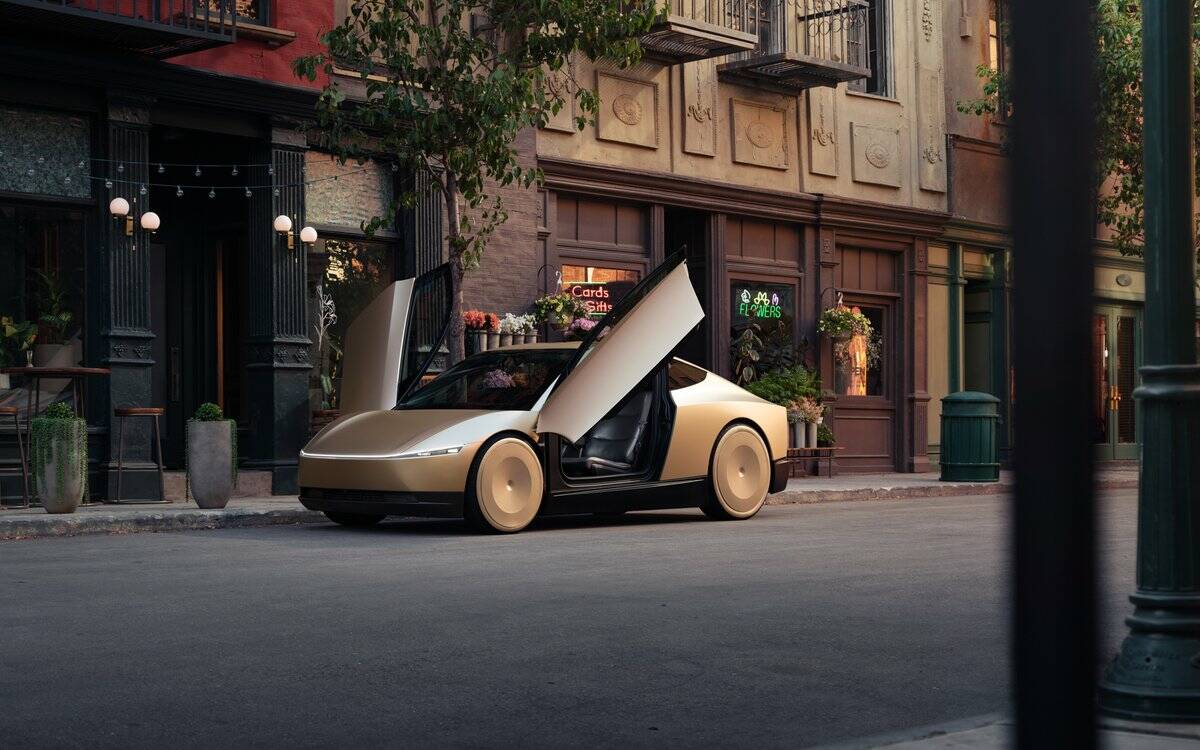Tesla's Big Reveal: Steering-wheel-free Robotaxi Will Charge Wirelessly

Complete with Back to The Future style folding doors, Tesla is showing off its Robotaxi at last, along with an autonomous minibus and the Optimus robot.
Tesla's big reveal took place at the electric car company's "We, Robot" event, held at a film set in Burbank, California, safely away from public roads. This is the first sighting of the hardware design; none of the gadgets are in production yet.
Dubbed "Cybercab" by the company's boss, Elon Musk, the Robotaxi can carry two passengers and is a purpose-built autonomous vehicle with no steering wheel or controls – just a two-seater compact cabin accessed through butterfly doors. While futuristic, the design follows cues from the company's other cars rather than the straight lines of its truck.
In addition to a lack of traditional driver controls, the Robotaxi also appears to be missing a charging port. According to Musk, the vehicle will use wireless charging.
The Robotaxi - we're told - will be priced keenly: below $30,000. It is scheduled to enter production in 2026, and hit the roads (where full self-driving is permitted) sometime in 2027, or at least that's what the company says.
There were delays to the vehicle right up until yesterday's event, which was postponed after Musk decided that the front of the car needed a tweak. So when Tesla gives its timings of when the Cybercab will hit the streets and its estimated cost, we suggest readers keep that under advisement.
Tesla also showed off its Optimus robot at the event, and Musk revealed a prototype of the Robovan, an electric autonomous vehicle capable of carrying cargo of up to 20 people at a time. He did not, however, provide a timeline or estimated cost for the art-deco-inspired minibus.
The Robotaxi is up against some tough competition. Companies such as Waymo have operated driverless cars for years, and Tesla cars have not yet achieved full self-driving functionality after a raft of issues – despite Musk's grandiose promises for the technology.
- Cruise fined $1.5M for failing to report right away its robo-car dragged a pedestrian
- Tesla Cybertruck recalled again. This time, a software fix for backup camera glitch
- Uber and China's BYD agree deal to roll out 100,000 EV fleet
- Musk deflects sluggish Tesla car sales with Optimus optimism
Musk has a long history of overpromising on technology and being optimistic about timelines. However, his companies have also delivered on some of those promises. While full self-driving without driver intervention seems to have been forever a year or two away, other technological tours de force, such as the landing and reuse of SpaceX Falcon 9 rockets, have revolutionized industries.
The big reveal of the Robotaxi, with its lack of driver controls, gives Tesla a deadline for making full self-driving a reality on public roads in the next two years. Watch this space. ®
From Chip War To Cloud War: The Next Frontier In Global Tech Competition
The global chip war, characterized by intense competition among nations and corporations for supremacy in semiconductor ... Read more
The High Stakes Of Tech Regulation: Security Risks And Market Dynamics
The influence of tech giants in the global economy continues to grow, raising crucial questions about how to balance sec... Read more
The Tyranny Of Instagram Interiors: Why It's Time To Break Free From Algorithm-Driven Aesthetics
Instagram has become a dominant force in shaping interior design trends, offering a seemingly endless stream of inspirat... Read more
The Data Crunch In AI: Strategies For Sustainability
Exploring solutions to the imminent exhaustion of internet data for AI training.As the artificial intelligence (AI) indu... Read more
Google Abandons Four-Year Effort To Remove Cookies From Chrome Browser
After four years of dedicated effort, Google has decided to abandon its plan to remove third-party cookies from its Chro... Read more
LinkedIn Embraces AI And Gamification To Drive User Engagement And Revenue
In an effort to tackle slowing revenue growth and enhance user engagement, LinkedIn is turning to artificial intelligenc... Read more



